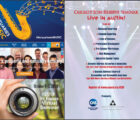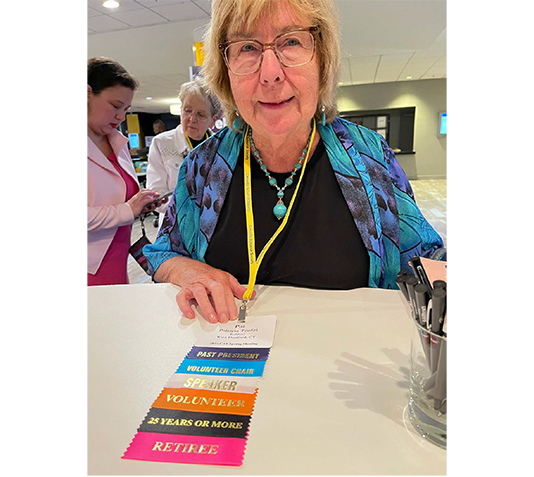The following is an excerpt from Nancy Braithwaite’s Presidential Address given at the CAS Annual Meeting in Anaheim, California on November 6, 2017.
I don’t like change. I admit it. Many of us are not comfortable with change; it’s natural. Yet, I’ve spent my year thinking about change; it’s unavoidable. And, I’m going to spend my last presidential moments with you talking about change. But, maybe I can also give you a comforting thought … “The more things change, the more they stay the same.”
This cliché came to mind throughout my year as president — and in a prominent way as I worked with the board on refreshing our strategic plan … The scope of actuarial practice has been a significant topic of conversation for our board. Casualty actuaries have specialized knowledge, but our scope of practice can be quite broad. And this is true even before we consider nontraditional roles of actuaries. The types of risks we are prepared to evaluate range from personal auto insurance to cyberrisk. We operate in insurance and risk management, and our skills are relevant and being used in many other areas.
CAS members are continuously exposed to new data and new techniques for analyzing those data; we are exposed to new product ideas and new societal risks. We are constantly expanding the body of actuarial knowledge. The same is true as we apply the tools and training we have to “nontraditional” areas of practice like claims, marketing and even banking.
… Innovation is one of two core values that are new to our strategic plan.
Casualty actuaries have been innovators from day one. Our Society was founded over 100 years ago by those actuaries who met the challenge of data collection and ratemaking for the new insurance coverage known as workers’ compensation. In the traditional roles of ratemaking and reserving, we are constantly innovating as new products are developed, and even before that, as data anomalies created interesting puzzles for us to solve.
… Two of the many changes we are facing today is the availability of massive amounts of data and the use of sophisticated techniques to get information out of that data. While many actuaries were and still are asking, “What do we do about these data scientists? Will they be taking our jobs?” The CAS has been creating a vehicle, through [the CAS Institute] iCAS, to bring professionalism and community to data scientists. iCAS also aims to bridge the communication gap, so that actuaries and data scientists can work effectively side-by-side and be more productive than either profession would be alone.
As I think of iCAS, and its first credential, the Certified Specialist in Predictive Analytics, my mind goes back to data anomalies. Whenever I think of data, I think about potential for incorrect data. For example, it is reported that over 20 percent of credit reports have incorrect data. Yet we use that data to make financial decisions. As available data increases and models become more complex, we have a professional responsibility to ask the right questions. Just because it appears that the data says something, do we believe it? Is it possible there’s something wrong with the data? Is it possible something has changed that affects the outcome of the model? Is it possible that something in the data has become a proxy for socially unacceptable rating factors? Professionalism and integrity are still among our core values.
… In the CAS’s traditional area of basic education, we continue to explore changes that keep the CAS the gold standard in P&C actuarial education. If you are a candidate or work with one, you’ve surely heard about the new integrated questions we’ve added to our exams. … We’ll be introducing TBE, technology-based examinations, which will allow the examination environment to be more like an actual work environment, questions and solutions can address situations an actuary would encounter at work.
Diversity can prepare us for change. We operate in a complex world. No one of us can be in tune with all of the things that are changing around us. The more diverse perspectives and ideas we are exposed to, the more prepared we can become for changes in our industry, as well as changes in our daily lives that will affect our industry.
We’ve also added into the syllabus some of the statistical theory that underlies predictive modeling. We know that all actuaries will need some understanding of the predictive modeling techniques that have become available with big data. This understanding complements the deeper learning that comes with an iCAS certification.
All of these initiatives nicely illustrate the “formerly-implicit-now-explicit” CAS core value of innovation.
The second new core value in our strategic plan is diversity.
As much as I hate change, I love diversity. Diversity has made my life richer. We talk about continuous learning — what better way to learn than to be exposed to people who’ve had different experiences and see the world differently?
… Have you ever thought about how many different kinds of actuaries there are or how much potential for success and job satisfaction there is? I mentioned some of the diversity as I talked about our scope of practice. It’s really amazing the varied work available to us! And there’s a place for all kinds of people in our profession — an opportunity for each type to find a niche where they can be successful.
Some of us like people and want to work on a team. Others are highly technical and prefer detailed analysis. Still others like the predictability and routine of an annual personal lines pricing review. Some of us even love the challenge of pricing a complex, new cyberrisk policy! …
Of course, diversity offers more than just personal satisfaction. Our employers, our industry, our society — they all benefit as well. Diversity can prepare us for change. We operate in a complex world. No one of us can be in tune with all of the things that are changing around us. The more diverse perspectives and ideas we are exposed to, the more prepared we can become for changes in our industry, as well as changes in our daily lives that will affect our industry. After all, our organizations seek to provide financial stability to those who own cars, and houses, as well as to those with complex business problems. Cultural changes in desire to own homes and cars, as we have seen with millennials, might come as a surprise. These changes, if unforeseen, might be a threat to our ability to adapt our products and services to the needs of our customers. It took our industry some time to catch up with the sharing economy when ride-sharing services first developed. As more and more workers are self-employed or contract workers, what does that mean for workers’ compensation insurance?
How can we contribute to product development without understanding the varied needs of our population? How can we contribute to profitability if we don’t know how our products will be used? As our employment opportunities become more global, diversity becomes even more important. Understanding the cultures we work in is essential to adapting our methods and becoming successful.
Diversity and innovation work hand in hand to help us adapt to change. Teams that are diverse have the opportunity to share and build on the creativity of their members. Our products can incorporate new features that a homogeneous team might not imagine.
So, let’s think again about change. Has anything changed since you started your career?
Even if you started in the profession two years ago, I’ll bet you’ve experienced some change. … The way I do my job today has nothing in common with the way I worked on day one, in fact it has little in common with what I did five years ago. If I told you half the things that have changed over my career, you’d think I was about 200 years old!
With the variety of actuarial work and the rate of change in the world around us, could you ever be bored as an actuary?
… To prepare to speak with you today, I, as many others before me, read through the addresses of previous CAS Presidents. … Do you know what the themes were?
- Education (keeping our system the gold standard).
- Globalization.
- Technology advances.
- Nontraditional roles (advancing actuarial science in these areas).
- Professional and ethical standards (maintaining these).
- Change (this is a recurring theme that is always happening at an ever-increasing rate. Sound familiar?)
We’ve got this. We’ve done it before. There are continuing challenges. There always will be. …
But the CAS, with its strong tradition of volunteerism and its committed leadership, will continue through innovation and diversity, and our other enduring values, to meet those challenges. …
Nancy Braithwaite, FCAS, is 2nd vice president for Travelers in New York City. In November 2017, she completed her term as CAS president and became CAS board chair.











